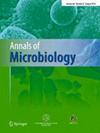Overflow metabolism provides a selective advantage to Escherichia coli in mixed cultures
IF 3.4
4区 生物学
Q2 BIOTECHNOLOGY & APPLIED MICROBIOLOGY
引用次数: 0
Abstract
It has previously been shown that organic acids produced by Escherichia coli suppress the growth of Pseudomonas aeruginosa in co-cultures under conditions of glucose excess, due to overflow metabolism. Inactivation of genes involved in central carbon metabolism favours fermentation of glucose over respiration and therefore increases production of organic acid by-products such as acetate and lactate. We sought to extend and refine the list of genes known to contribute to the metabolic balance between respiration and fermentation, to better understand the role of overflow metabolism in competitive survival of E. coli. We confirmed the previous finding that E. coli excludes P. aeruginosa from co-cultures by producing organic acids in the presence of glucose. Using a genome-wide transposon screen we identified E. coli genes that are important for survival in co-cultures with P. aeruginosa, both with and without glucose supplementation. Central carbon metabolism was the dominant gene function under selection in our experimental conditions, indicating that the observed inhibition is a side-effect of overflow metabolism adopted by E. coli as a response to high glucose concentrations. The presence of a competing species increased the selective pressure for central carbon metabolism genes, with 31 important for growth in the presence of P. aeruginosa and glucose, while only 9 were significant for pure E. coli cultures grown with glucose. In our experiments, each transposon mutant was competed against all others in the pool, suggesting that overflow metabolism provides benefits to individual E. coli cells in addition to competitive inhibition derived from acidification of the growth medium. Co-culture assays using transposon mutant libraries can provide insight into the selective pressures present in mixed species competition. This work demonstrates central carbon metabolism is the dominant gene function under selection in E. coli for aerobic growth in glucose and a side-effect of this is overflow metabolism which can inhibit growth of bystander species.溢出代谢为混合培养物中的大肠杆菌提供了选择优势
以前的研究表明,在葡萄糖过剩的条件下,大肠杆菌产生的有机酸会抑制铜绿假单胞菌在共培养物中的生长,这是溢出代谢的结果。参与中心碳代谢的基因失活有利于葡萄糖发酵而非呼吸作用,因此增加了有机酸副产物(如醋酸盐和乳酸盐)的产生。我们试图扩展和完善已知有助于呼吸和发酵之间代谢平衡的基因列表,以更好地了解溢出代谢在大肠杆菌竞争性生存中的作用。我们证实了之前的发现,即大肠杆菌在葡萄糖存在的情况下通过产生有机酸将铜绿微囊藻排除在共培养物之外。通过全基因组转座子筛选,我们发现了大肠杆菌在与铜绿微囊藻的共培养物中生存所需的重要基因,无论是在有葡萄糖补充还是没有葡萄糖补充的情况下。在我们的实验条件下,中心碳代谢是受选择影响的主要基因功能,这表明所观察到的抑制作用是大肠杆菌为应对高浓度葡萄糖而采用的溢出代谢的副作用。竞争物种的存在增加了中心碳代谢基因的选择压力,其中 31 个基因对铜绿微囊藻和葡萄糖的存在下的生长很重要,而只有 9 个基因对纯大肠杆菌培养物与葡萄糖的生长很重要。在我们的实验中,每个转座子突变体都与池中的所有其他突变体竞争,这表明除了生长介质酸化产生的竞争性抑制作用外,溢出代谢还为单个大肠杆菌细胞提供了益处。利用转座子突变体库进行共培养试验,可以深入了解混合物种竞争中存在的选择压力。这项研究表明,中心碳代谢是大肠杆菌在葡萄糖中进行有氧生长的主要基因功能,其副作用是溢出代谢,可抑制旁观物种的生长。
本文章由计算机程序翻译,如有差异,请以英文原文为准。
求助全文
约1分钟内获得全文
求助全文
来源期刊

Annals of Microbiology
生物-生物工程与应用微生物
CiteScore
6.40
自引率
0.00%
发文量
41
审稿时长
3.2 months
期刊介绍:
Annals of Microbiology covers these fields of fundamental and applied microbiology:
general, environmental, food, agricultural, industrial, ecology, soil, water, air and biodeterioration.
The journal’s scope does not include medical microbiology or phytopathological microbiology.
Papers reporting work on bacteria, fungi, microalgae, and bacteriophages are welcome.
Annals of Microbiology publishes Review Articles, Original Articles, Short Communications, and Editorials.
Originally founded as Annali Di Microbiologia Ed Enzimologia in 1940, Annals of Microbiology is an official journal of the University of Milan.
 求助内容:
求助内容: 应助结果提醒方式:
应助结果提醒方式:


